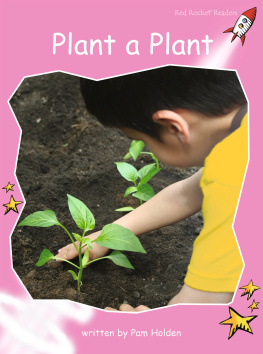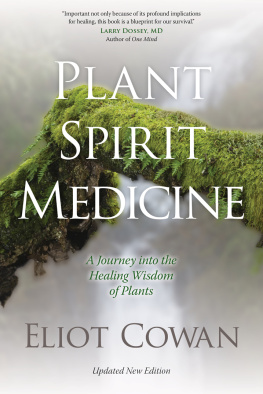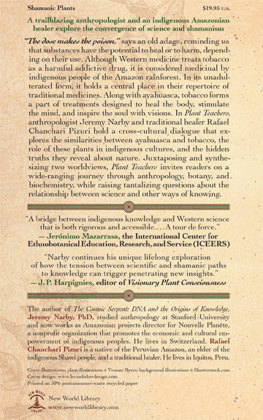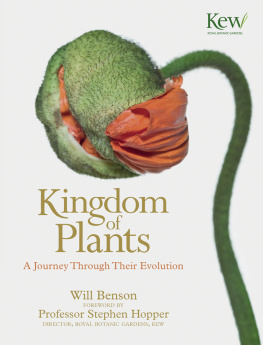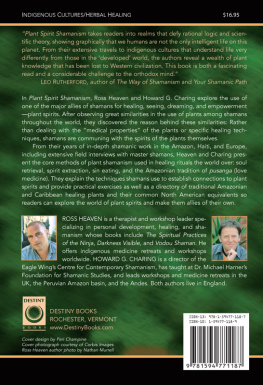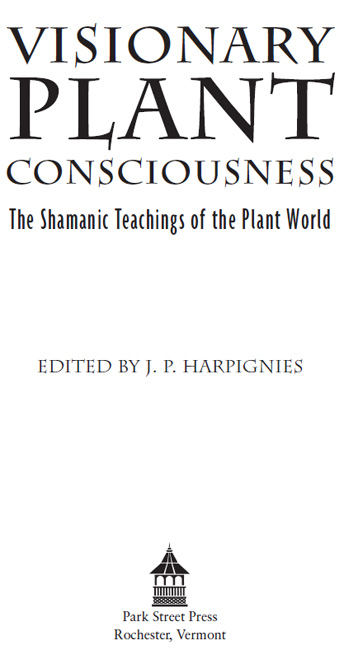
Foreword
Humans have long considered psychoactive plants as teachers that enhance healing, thinking, and perception. But many contemporary societies outlaw these plants.
True, working with psychoactive plants is tricky. They have a shadow side, they take time to get to know, and approaching them casually is inappropriate. But many indigenous people claim nature speaks to humans through these plants; and entertaining such a dialogue, which is the job of shamans, helps keep the human community healthy. In contrast, most contemporary North Americans and Europeans fear using shamanic plants. This is due to history, and to lack of know-how.
This book contains the spoken words of people who seek to inform Westerners about these powerful plants and about the shamans who know how to use them. Their words are clear and simple, and often based on personal experience. The result is an accessible book packed with knowledge. Ethan Nadelmann sums up its main goal: to learn to live with the worlds wide range of plants so that they cause the least possible harm and bring the greatest possible benefit.
I invite readers to enjoy this book as an intellectual adventure.
JEREMY NARBY, PH.D.
Jeremy Narby presently works for the Swiss-based non-profit Nouvelle Plante to assist indigenous groups to map and defend their ancestral lands. (A more extensive biography of Jeremy Narby appears on page 206.)
Preface
The material in this book originated at the Bioneers Conferences that were held between 1990 and 2004. Bioneers is an annual gathering of environmental and social visionaries who are working with nature to heal nature. The work of these biological pioneers is focused on both practical and visionary solutions for restoring the Earth and its peoples, in recognition of the symbiotic interdependence of the web of life.
You might wonder why a forum focused on environmental restoration and social justice would address the gnarly topic of hallucinogenic plants. The answers are woven brightly throughout these pages.
At this critical moment in time, our species is straddling an unprecedented historical discontinuity in our relationship with the natural world. We are compromising the very life-support systems of the planet on which all life depends. However, the solutions to many of our most dire challenges reside precisely in the nature we are heedlessly destroying. The Bioneers, including those represented in this book, propose that there is a profound intelligence in nature, a more-than-human mind of nature whose operating instructions we need to learn and mimic to successfully navigate this epic cusp in human and planetary evolution.
Many ancient indigenous traditions, as well as modern re-inventions of traditional knowledge, suggest that a special intelligence resides in certain sacred plants and organisms, including cacti and fungi. This vegetable mind, they tell us, can open new and different ways of seeing the world that reveal the most basic of biological truths: As human beings, we are part of nature. We are the environment.
The voices in this book believe that these sacred plants hold crucial keys to transforming our consciousness in order to reconnect us with the natural world and our own nature, to help us find our rightful and harmonious place in the web of life. That is why the Bioneers Conference has long included this controversial topic as one important piece of the larger puzzle of environmental protection and restoration.
The illustrious contributors to this collection counsel us that shamanic plants deserve great respect. Indigenous and traditional cultures honor them as profound healing and spiritual forces that people must approach with caution, sobriety, and humility. These plants are powerful teachers that can also be dangerous or harmful under certain circumstances or for certain people. Sadly, however, due to the societal misinformation and disinformation shrouding them, there is scant scientific research to help us better understand both their gifts and their perils.
For these reasons, we hope that this remarkable assemblage of some of the most brilliant, learned, and wise explorers among us will shed real light on this tragically taboo subject. If these individuals are correct, the Earth is speaking to us through these magical sacraments, making the invisible world visible, helping us read the mind of nature. Never have we needed so acutely to grasp the story of interdependent oneness, and to act accordingly.
KENNY AUSUBEL
FOUNDER, BIONEERS
SANTA FE, NEW MEXICO
JANUARY 2006
A 1972 graduate of Columbia University, Kenny Ausubel is an award-winning author, filmmaker, and social entrepreneur specializing in health and the environment. In 1990, Ausubel founded the Bioneers Conference and its parent nonprofit organization, the Collective Heritage Institute (CHI). The Bioneers Conference brings together leading social and scientific innovators focused on practical solutions for restoring the Earth. The event bridges environmental technologies with social, spiritual, and cultural solutions. Ausubel founded Bioneers shortly after co-founding Seeds of Change, Inc., the nations leading national organic seed company promoting backyard biodiversity. In 1999, he wrote When Healing Becomes a Crime: The Amazing Story of the Hoxsey Cancer Clinics and the Return of Alternative Cancer Therapies (Inner Traditions, 2000). Ausubel has also produced three documentary films: Los Remedios: The Healing Herbs (1982), Hope and a Prayer: Attitudinal Healing with Dr. Bernie Siegel (1985), and the award-winning, feature-length Hoxsey: How Healing Becomes a Crime (1987).
Introduction
This book is a collection of edited talks and panel discussions on the subject of the main shamanic (i.e., vision-inducing/consciousness-altering) plants of the New World and their relationship to human culture and knowledge. As such, it features a very diverse range of some of the leading figures associated with the study and/or use of the psychoactive plants of the Americas. These figures include ethnobotanists, anthropologists, medical researchers, writers, gardeners, artists, thinkers, cultural and religious figures, et al. A few of the contributors (Dr. Andrew Weil, Wade Davis, Michael Pollan) are very well-known in the larger culture for other accomplishments; several are celebrities within certain substantive subcultures or sectors of the population (Terence McKenna, Alex Grey, Paul Stamets, Jeremy Narby, John Mohawk); some are highly respected but generally known only within their scientific fields (Dr. Charles Grob, Dennis McKenna); and others are not widely known outside their own smaller circles of cognoscenti.
The names I mentioned above are predominantly white males, because the most well-known figures in these fields, those whose names are most widely recognizable, are white males. Yet this collection also features some strong, highly accomplished, feminine and indigenous thinkers in its mix, something very frequently lacking in other books that have covered this terrain. Their voices are not heard enough, and what they have to say is every bit as fascinating as the talks by the more famous folks with whom they share these pages.
The essays are a mix of solo presentations and panel discussions, and some of the contributors make several appearances in the book. We very intentionally wanted to offer a mix of lectures by individuals, dialogues, trialogues and larger panel discussions. The ethnobotanist and artist Kathleen (Kat) Harrison is the contributor who appears most frequently, since she led and convened many of the most interesting panels we witnessed over the years and especially because her unique approach to plant wisdom brings a vitally important, deeply conscious, feminine voice to the discussion.
Next page

